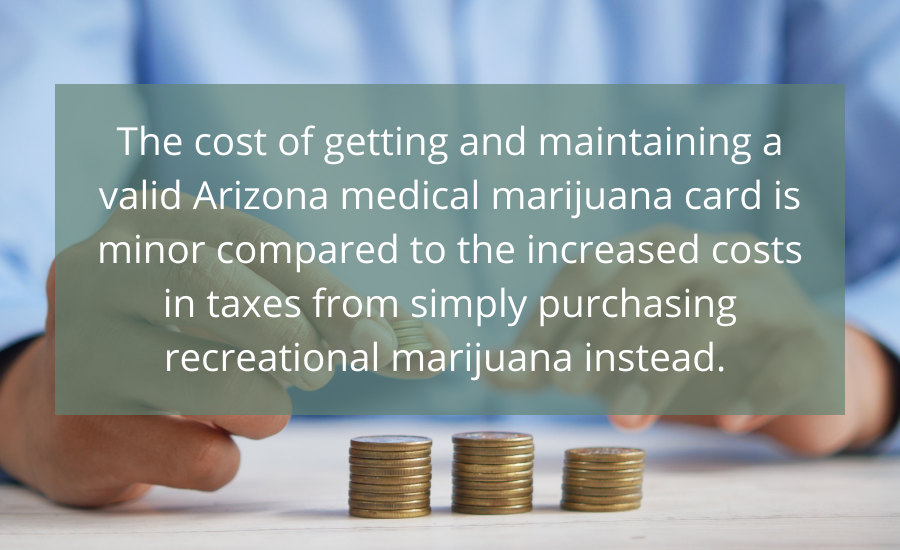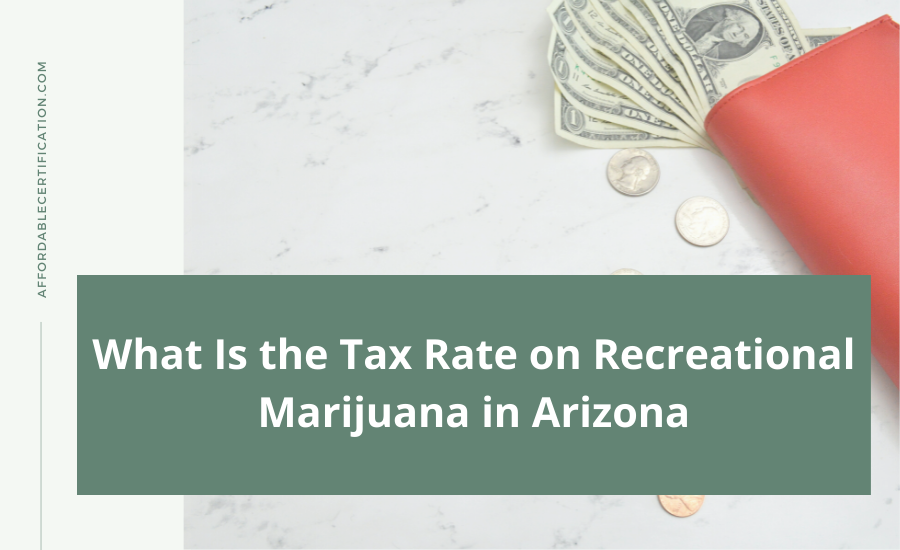Short answer: Arizona levies an excise tax of 16 percent on recreational marijuana sales in the state. Moreover, local municipalities can charge a local sales tax of up to 8 percent on all purchases of any marijuana products within their jurisdiction.
Medical marijuana has been legal in Arizona since 2010, while recreational marijuana became legal a decade later, in 2020. Now that Arizona allows recreational marijuana sales to anyone 21 and older, it may seem that going through the steps and enduring the expense of getting an Arizona medical marijuana card is no longer worth it. But, when it comes to factors of cost, there are still huge advantages to holding a valid Arizona medical marijuana card over simply purchasing recreational marijuana.
Plainly put, medical marijuana patients can save a lot of money in marijuana purchases over recreational users, and a large part of the reason for that has to do with taxes.
Medical marijuana patients in Arizona do not have to pay taxes on marijuana purchases at dispensaries. This can be an incredible saving to people already dealing with debilitating medical problems and the potential costs and lost income that often come with them.
Read also: Official 2022 Arizona Laws and Rules for Medical Marijuana Cards.
Types of Taxes on Recreational Marijuana in Arizona
Federal Taxes on Recreational Marijuana in Arizona
As marijuana remains illegal federally, the federal government obviously collects no taxes on marijuana sales in Arizona of any sort (be they recreational or medical marijuana sales.)
State Taxes on Recreational Marijuana in Arizona
Arizona levies an excise tax of 16 percent on recreational marijuana sales in the state. (This is also known as “sin tax” or “luxury tax.”) Consumers pay this tax at the time of purchase from any Arizona marijuana dispensary; then, the dispensary remits those taxes to the state.
(In 2021, the state of Arizona garnered $217,553,000 in excise tax revenue on marijuana sales.)
Arizona medical marijuana patients do not have to pay state taxes on medical marijuana.
Municipal Taxes on Recreational Marijuana in Arizona
There are currently no local, or municipal, taxes on marijuana per se in Arizona. However, local municipalities can charge a local sales tax of up to eight percent on all purchases of any products within their jurisdiction; and, both medical marijuana patients and recreational marijuana consumers must pay this tax on all of their marijuana purchases.
Where Do Recreational Marijuana Taxes Go in Arizona?
Excise tax revenues in Arizona from recreational marijuana sales go to:
- Attorney General’s Office
- Community colleges
- Fire districts
- Highway User Fund
- Justice Reinvestment Fund
- Municipal police
Read also: Average Weed Price in Arizona.
 Other Cost Differences Between Medical and Recreational Marijuana in Arizona
Other Cost Differences Between Medical and Recreational Marijuana in Arizona
There are several other differences between medical marijuana and recreational marijuana in Arizona that may indirectly, yet significantly, affect the user’s costs.
Purchase and Possession Limits
In Arizona, medical marijuana patients can buy and possess up to 2.5 ounces of marijuana in any form (including extracts) in any 2-week (14-day) period. Recreational consumers can only buy and possess up to one ounce of marijuana at a time, or up to five grams of cannabis extract, or concentrate.
By being able to purchase more medical marijuana in one visit to a dispensary than a recreational marijuana consumer, a medical marijuana patient has to make fewer trips to a dispensary to replenish their supply of marijuana. This equates to fewer gas or other transportation costs and less time taken out of your busy life to go to the dispensary to make a purchase.
Relatedly, as of the end of 2021-the first year of tax collection on marijuana sales in Arizona-there were 169 medical marijuana dispensaries in the state, while there are only 73 dispensaries serving recreational marijuana in Arizona. This means many recreational marijuana consumers also have a bigger distance to travel than medical marijuana patients to purchase their marijuana.
Read also: What Allotment Medical Marijuana Patients Have in Arizona.
Cultivation
Many marijuana users find they can save a great deal of money by growing their own marijuana instead of purchasing it at a dispensary. Medical marijuana patients in Arizona can cultivate up to 12 marijuana plants (as long as they live more than 25 miles from the nearest dispensary.) Recreational marijuana consumers in the state, however, can only grow up to six plants (or 12 plants if there are two adults in the same household.)
That means medical marijuana users can grow double the amount of marijuana that recreational consumers can grow, potentially saving home cultivators of medical marijuana twice as much as recreational marijuana consumers can save by growing their own.
How to Get a Medical Marijuana Card in Arizona
All you need to get a medical marijuana card in Arizona from the comfort and safety of your own home using telehealth services are the following:
- Internet connection
- Internet-capable device, such as a smartphone, tablet or computer
- Cell phone number or email address
- Valid photo ID (either an official Arizona state ID, Arizona driver’s license or U.S. passport)
Once you have all of these requirements met, follow these simple steps to get your Arizona medical marijuana card:
- Sign up at our site (https://affordablecertification.com/) by creating an account (with a username and password,) filling out a brief intake form and taking and uploading a picture of yourself and your valid photo ID. You must also sign a telemedicine consent form.
- Schedule a telehealth appointment with one of our licensed Arizona medical marijuana doctors or simply enter the virtual waiting room and wait for the next available doctor (Wait time is usually 15-20 minutes.) If there is an issue with the videocall, the doctor will call you back. Our business hours are between 10 am and 8 pm Mondays – Saturdays.
- Attend that appointment, providing any proof of diagnosis or medical records you may have verifying your qualifying condition (though medical records are not required for this visit.) Assuming the doctor’s approval of your qualifications, by noontime of the following business day, you will be able to download your doctor’s medical marijuana certification.
- Pay our small fee of $99. You pay no fee until after your doctor’s visit; and, if the doctor finds that you don’t qualify for medical marijuana in Arizona, you don’t pay any fee at all for the visit. We will also provide assistance with your registration on the state medical marijuana patient portal for an additional fee of $20.
- Register with the AZDHS at medicalmarijuana.azdhs.gov as a medical marijuana patient in the state and pay the corresponding fee (see below.)
- Wait for your application to be approved and receive your digital card via email. This can happen as quickly as 30 minutes from the time of completing your application and registration.
The cost of getting and maintaining a valid Arizona medical marijuana card is minor compared to the increased costs in taxes from simply purchasing recreational marijuana instead. Arizona medical marijuana patients must pay the state $150 to obtain or renew a medical marijuana card (although residents on SNAP, or the Supplemental Nutrition Assistance Program, get a 50-percent discount on that fee, paying only $75.) An Arizona medical marijuana card is valid two years.

